READER COMMENTS ON
"EXCLUSIVE: Renowned Computer Security Expert Agrees to Meet California County Supervisor's '1000 to 1' Challenge to 'Manipulate' Sequoia Voting Machine!"
(42 Responses so far...)
COMMENT #1 [Permalink]
...
leftisbest
said on 12/12/2006 @ 4:04 pm PT...
Hey Brad - nice scoop. Way to go!!
This can have national implications - no doubt, and Debra Bowen's office should have a real interest in seeing this demonstration.
COMMENT #2 [Permalink]
...
Dan
said on 12/12/2006 @ 5:08 pm PT...
The guy in the middle says it all
COMMENT #3 [Permalink]
...
Grizzly Bear Dancer
said on 12/12/2006 @ 5:09 pm PT...
ALL BETS IN.
State Funded Brad Blog..i love it!!!
COMMENT #4 [Permalink]
...
Bev Harris
said on 12/12/2006 @ 5:14 pm PT...
This is superb! Just outstanding. I take my hat off to Tom Courbat, who along with the powerful citizens team in Riverside has been just brilliant with this, and to Velvet Revolution and to you, Brad. I am thrilled to see that Hursti has agreed to do this.
If there is anything we can provide to assist, please let me know.
Bev Harris
Founder, Black Box Voting
COMMENT #5 [Permalink]
...
big dan
said on 12/12/2006 @ 7:59 pm PT...
Hey! The 4 greatest women in the U.S! Bev Harris above me, and today on Democracy NOW! (link below), Amy Goodman, Cindy Sheehan, and Medea Benjamin...
http://www.democracynow.....pl?sid=06/12/12/1459218
...rounding out the "bottom 10" women in the U.S...Condi Rice, Catherine Harris, and the Hewlett Packard spying chick CEO...
COMMENT #6 [Permalink]
...
Pat A. Vesely
said on 12/12/2006 @ 8:34 pm PT...
Great news Brad! You know who I've got my money riding on!
Go get 'em Harri and Hugh.
Pat A. Vesely 
COMMENT #7 [Permalink]
...
Larry Bergan
said on 12/12/2006 @ 8:41 pm PT...
Voting machine challenge "SMACKDOWN"! See it here!
COMMENT #8 [Permalink]
...
oldturk
said on 12/12/2006 @ 10:01 pm PT...
Hope that thing malfunctions like a solar calculator on a cloudy day.
More good news the Dems take another seat in the US House by winning a run off election.
Link to Demo win.
COMMENT #9 [Permalink]
...
unirealist
said on 12/12/2006 @ 10:02 pm PT...
I've got fifty bucks to wager on this. Where do I send it? Don't let them start til I get my money down.
COMMENT #10 [Permalink]
...
MMIIXX
said on 12/12/2006 @ 11:04 pm PT...
until Stone replies "hold ya bets" .
COMMENT #11 [Permalink]
...
MMIIXX
said on 12/12/2006 @ 11:27 pm PT...
OT
Does this look odd (from wiki)
"In the only unresolved election among Texas's 32-member Congressional delegation, Henry Bonilla emerged with 48.1% and Ciro Rodriguez with 20.3%.
Rodriguez won the runoff, defeating incumbent Congressman Henry Bonilla 54%-46%. This makes his district the 31st Democratic pickup in the 2006 midterm elections and the second from Texas. [2] Congressman-Elect Rodriguez will begin his fifth term when the 110th Congress convenes in January, 2007."
Question .What method of voting does this area use .Odd getting lower % ?
less opportunity to manipulate the runoff ?
COMMENT #12 [Permalink]
...
Dredd
said on 12/13/2006 @ 6:41 am PT...
The $100 I put up ... well ... it is a more sure investment than the stock market!
COMMENT #13 [Permalink]
...
md
said on 12/13/2006 @ 8:31 am PT...
What do you think is going to stop the voting machine company from changing the software in the machine/s used for this so that what he expects to do for the hack doesn ot indeed work?
Maybe I am just to cynical but I doubt if this does happen that it will be a fair test of the system.
COMMENT #14 [Permalink]
...
Charlie L
said on 12/13/2006 @ 8:40 am PT...
Brad: I have three words for you...
PAY PER VIEW
I want my ERTV!!! (Election Reform TV)
Charlie L
POrtland, OR
COMMENT #15 [Permalink]
...
KestrelBrighteyes
said on 12/13/2006 @ 9:04 am PT...
Any programmer can tell you, there is NO SUCH THING as a totally unhackable system.
Go get 'em!!
COMMENT #16 [Permalink]
...
JohnLopresti
said on 12/13/2006 @ 10:28 am PT...
I agree with MD, above. Maybe Riverside should impound some machines now, if there are any unaltered since the recent election; to take a snapshot of what was their degree of hackability in the November 2006 election. Additionally, Hursti should have as much time pre-test to prepare as hackers would once they knew precisely which models of the machines were deployed. For example, in San Diego, a different vendor's machines went home with pollworkers weeks pre-November 2006 election. Brad, good work on the yellow button story, as well; voting often, indeed. I would be most confident in fairness of the test if SoS-elect DebraB is the one arranging for a verisimilar preparation time for Hursti's test, to replicate the degree of opportunity for malintentioned persons to develop hacks.
COMMENT #17 [Permalink]
...
Brad
said on 12/13/2006 @ 11:28 am PT...
MD asked:
What do you think is going to stop the voting machine company from changing the software in the machine's used for this so that what he expects to do for the hack doesn ot indeed work?
Maybe I am just to cynical but I doubt if this does happen that it will be a fair test of the system.
You're not suggesting that Sequoia wouldn't play fair are you?  --- There is no doubt that appropriate ground rules will have to be in place. Hursti has been through this before (as when McPherson's office, with the direct work of Diebold, tried to hoax him in Sacramento after the Leon County hack. Hursti didn't fall for it.)
--- There is no doubt that appropriate ground rules will have to be in place. Hursti has been through this before (as when McPherson's office, with the direct work of Diebold, tried to hoax him in Sacramento after the Leon County hack. Hursti didn't fall for it.)
COMMENT #18 [Permalink]
...
md
said on 12/13/2006 @ 1:19 pm PT...
You're not suggesting that Sequoia wouldn't play fair are you?
Suggesting..nah...I think it is more like stating a fact. How much would one of these companies pay to have a test like this fail and then how much would they pay to get it broadcast all over the news, internet etc etc...
COMMENT #19 [Permalink]
...
BIbig dan
said on 12/13/2006 @ 1:21 pm PT...
Hursti & Co. should be able to prove beyond a doubt, that the machine for the bet is in the state it was normally in...no "extra" security. I always thought they COULD be more secure, if they wanted them to be. But, any computer can be hacked anyway, but this bet should be on a "typical" Sequoia e-vote machine, the way it was during the election...it should not be touched since it was used during the election up to the bet.
The e-vote machine for the Hursti Hack, I assume, was in the state it was in for the most recent election it was used in? Right?
Who's on the hook for 1 million on their side, btw? That's a lot of $$$...they have to pay it if they lose...I would make sure they don't take "steps' to make sure they don't lose 1 million dollars!
COMMENT #20 [Permalink]
...
phil
said on 12/13/2006 @ 1:38 pm PT...
Tear it up Hursti.
Show the retards what a wizard can do.
The stakes should be higher.
Forget the money.
This isn't a game we are playing here.
It's national security.
COMMENT #21 [Permalink]
...
howdy
said on 12/13/2006 @ 2:55 pm PT...
I'm going to "bet" like before that Hursti isn't going to get into the software to hack it. He won't be able to get past the physical security and the county will have the test framed in such a way as to simulate actual conditions and not allow extraordinary access (like allowing them to remove panels). But then there'd be a howl around here that the tests were fixed. You know it's happened before.
Hey, how about my county testing most of their touch screens and a full recount in a couple of contests and the paper matched the machine count except in a couple of voter intent questions? Nothing?
How can you get disabled voters to vote without any assistance? Anyone?
COMMENT #22 [Permalink]
...
Brad
said on 12/13/2006 @ 3:43 pm PT...
Well howdy Howdy! Glad you made it by!
Since you discuss your county and suggest you've got knowledge that the rest of us don't, I hope you'll feel free to offer some transparency to that knowledge and let us know both the county you speak of as well as who you are and how you come by that knowledge.
Seems only fair if we're to take that information seriously.
With that in mind, please see the article I just posted with the latest on the "Riverside Challenge" as it speaks a bit to those ground rules and what you seem to regard as "actual conditions".
BTW, there was no "removal of panels" that I've ever heard of regarding Hursti's landmark Leon County, FL hack. So perhaps you can help us out by expanding on that comment which seems to marginalize Hursti's exploit and the ease in which he flipped an entire election without leaving a trace behind on Diebold voting machines.
Thanks!
COMMENT #23 [Permalink]
...
howdy
said on 12/13/2006 @ 4:01 pm PT...
http://www.santacruzsent...ocal/stories/04local.htm
and here's the elections department showing the results: http://www.votescount.com/
I'm not sure how to use the html things.
It's a combo of Sequoia paper and plastic. All absentees and most of the precinct votes were on paper. The recount boards used the paper trail. Any remade ballots used the original and showed the reason for the remake. Any spoiled ballots were reviewed.
I'd like to find a place to talk about spoiled ballots. Now, in California, any mark made on a ballot that isn't to show the intent of the voter void the ENTIRE BALLOT. No more writing "Dweeb" next to Arnie's name.
I'm sure that after watching another recount, I'd hate to hope for hand counts. Hand recounts are great for transparency and that's they're law.
I would have liked Mr. Hursti to have had a go at hacking a system while at the Voting Systems Testing Summit last November. There are varying accounts on why he didn't. One was that he couldn't get through the physical security of the test device. Another was that the device in question wasn't one used in Califoria. Just wondering.
What I mean by actual conditions are setting the machine up for voting and then turning the tester loose on it and then open the polls, close the polls and check the tape. I'm really interested to see if someone can get past the audit trail and give altered results that get past the hand recount.
COMMENT #24 [Permalink]
...
the_zapkitty
said on 12/13/2006 @ 4:33 pm PT...
Howdy.posting ()void_where_prohibited_by_law;
if
Howdy=maxCoverAssmode writeln "Ha! If that's so why was Hursti afraid to come to California where we Diebold shills had written up a rigged challenge under conditions that we couldn't possibly lose and issued it over the California Secretary Of State's letterhead and we invited everybody except the public and the press to hack the machine and held the challenge all day long except that we didn't actually hold such a challenge and nobody dared to show up to take that challenge and when Hursti didn't show up to take it he cheated by removing the panels from the machine. So there."
elseif
Howdy=hiding writeln ""
else writeln "Mommy! They're picking on me!"
End Howdy.posting
COMMENT #25 [Permalink]
...
MMIIXX
said on 12/13/2006 @ 8:56 pm PT...
howdy asked ...
"How can you get disabled voters to vote without any assistance?"
Why not have a human assistant ?
Train people to "assist" any "disabled voters" ,enough per polling place to cover the election day ,say 3 assistants should be enough.
And have them swear a "non disclosure" oath to not reveal any "disabled voters" choices.
It works for doctors ,lawyers etc.
What percentage of the population qualify as "disabled voters" ?
The whole "disabled voters" thing is a "front" to cover the introduction of Computer Voting Machines to enable easier manipulation of your vote .
Look at the Pentagon Computer Security Budget and high school kids can hack their computer systems ,what chance is there to make Computer Voting Machines unhackable ?
COMMENT #26 [Permalink]
...
the_zapkitty
said on 12/13/2006 @ 10:17 pm PT...
... MMIIXX said...
howdy disingenoued ...
"How can you get disabled voters to vote without any assistance?"
"Why not have a human assistant ?"
Because the liars who foisted these pieces of crap on voters nationwide made a big deal out of how e-voting would "enable disabled voters to vote secretly and independently"... even though it turns out that this did not happen and that many of the machines were actually badly designed for their purported task of helping the disabled.
But the corporate lies were then tied to the diabled being able to vote through HAVA, and now we must deal with the aftermath. The disabled must be able to vote independently and secretly. Which, in itself, is not a bad thing from my point of view 
Now I just found out about this site, and I'm hoping it pans out. They're supposed to be already in use in California and I've asked for samople materials if they can provide them:
http://www.vote-pad.us
What percentage of the population qualify as "disabled voters" ?
Way more than enough to turn the tide of many recent elections... which makes abusing the disabled as an added excuse to ram e-voting machines down the voters' throats even more shameful.
"The whole "disabled voters" thing is a "front" to cover the introduction of Computer Voting Machines to enable easier manipulation of your vote ."
Yes, we were used. We were used both as an excuse and as a guarantee of profitable contracts by the e-voting corporations... but we're here now and I don't think we're leaving 
COMMENT #27 [Permalink]
...
Brad
said on 12/13/2006 @ 10:27 pm PT...
ZapKitty, search for Vote-PAD here at BRAD BLOG and you'll find coverage.
California (McPherson) torpedoed Vote-PAD. They certified every piece of unsecure electronic garbage in the world, but drew the line at the non-electronic Vote-PAD. Go figure.
COMMENT #28 [Permalink]
...
Brad
said on 12/13/2006 @ 10:35 pm PT...
BTW, since "Howdy" refused to provide transparency here, I'll offer a bit. "Howdy" works for Santa Cruz County. Where they use Sequoia voting systems as well. Just in case you're wondering why she's pointing towards the Santa Cruz links and jumping in to defend the use of Sequoia on these threads.
Wanna invite Hursti up to Santa Cruz, Howdy?
Howdy, say Howdy to Hursti...Hursti, say Howdy to Howdy.
COMMENT #29 [Permalink]
...
the_zapkitty
said on 12/13/2006 @ 11:30 pm PT...
Actually I first heard about Vote-PAD from you. One of your recent radio broadcasts. Before that I'd been hellbent on the idea that eletronics would have to be required for disabled voters to produce paper ballots, and was equally unhappy with the insecurity such methods would bring the diabled... but then my degree is in digital electronics 
The simplicity of the Vote-PAD solution is inspired.
So another thanks to Bradblog!
COMMENT #30 [Permalink]
...
howdy
said on 12/14/2006 @ 7:32 am PT...
Nope, I just watched the vote and observe the polls. There were certain laws in place for this election I was interested in. But apparently that's not the case around here.
So, the only approved post on Brad Blog is, "You're right." and the one which should be on the next tshirt, "Brad Blog: DITTO" There's no room for discussion? All votes are hacked? No need for proof?
It took Santa Cruz 3 days for 5 people to count 3,785 ballots. There's about 3,500 counties in the US. Let's just say, the Rapture comes and you can get HAVA changed to do away with unassisted voting (which is my main thing if you want to know). Let's say you are able to scrap all those stupid machines and get Congress to make hand counting the law. Whose fault will it be if no one shows up at some counties to count the vote? Blind people can't do it. Deaf people can't do it. People with limited mobility can't do it. They must rely on the physically capable to count their votes like they do now. Whose fault will it be if no one shows up? Or may 12 people for 120,000 ballots?
Or should I just stick to, "Oh, my God. You're all right. I was wrong. Ditto."
COMMENT #31 [Permalink]
...
howdy
said on 12/14/2006 @ 7:52 am PT...
Wasn't vote-pad not certified because it didn't contain the paper audit trail required for California voting machines? I mean besides the secret society rigging the vote in Texas. Here's another thing which I expect the new Secretary of State to bring up, how can a disabled voter who can't read the paper, verify their vote on a VVPAT?
The law is still the law. All voters must be able to vote without assistance. Making fun of me doesn't change that law. If you need to maginalize disabled citizens to make a point go ahead but some people think that's wrong.
COMMENT #32 [Permalink]
...
the_zapkitty
said on 12/14/2006 @ 9:14 am PT...
... howdy said...
"Wasn't vote-pad not certified because it didn't contain the paper audit trail required for California voting machines?"
Strangely enough, Vote-PAD is rumored to produce a paper ballot... something which sensible people think trumps an easily gamed "paper trail" hands down.
"I mean besides the secret society rigging the vote in Texas."
Ah, the much-rumored Secret Society Of Secretaries Of State On The Take. Hmmm... I hear they've recently had something of a membership decline.
"Here's another thing which I expect the new Secretary of State to bring up, how can a disabled voter who can't read the paper, verify their vote on a VVPAT?"
Come to think of it... how can we verify our vote on an e-voting machine?... Oh... we can't.
But with Vote-PAD we can know we've filled out a paper ballot... (... assuming someone hasn't replaced the ballot with an SoS-Dan flyer...)
"The law is still the law. All voters must be able to vote without assistance."
Yo, stupid, listen close now: That is not the law.
If you are involved with elections and you think that is the law then you need to resign immediately and sue whoever trained you.
The law says that disabled voting needs should be met at least to the standards of the Americans with Disabilities Act. This means that the disabled need to be able to cast their ballots secretly and securely. That means voting without having to reveal their choices to anyone and voting with assurance that their vote will actually be counted.
If the voters require assistance in achieving these goals then that is perfectly fine under the law.
Vote-PAD seems to fill the needs of disabled voters admirably... with no kickbacks to Sequoia or Diebold required.
"Making fun of me doesn't change that law."
No. Making fun of an e-voting shill who's deliberately lying is just a side benefit.
"If you need to maginalize disabled citizens to make a point go ahead but some people think that's wrong."
Oh really?... your "friends" at the e-voting corporations did a hell of a job of marginalizing me when I lost the ability to vote securely and independently...
... but then they did the same with everybody else in the state so I guess you'd call that equal treatment.
But the e-voting companies then paraded around using the big lie, the lie of blind people like me voting "securely and independently" using their easily corrupted machines, in an attempt to guarantee that their pockets would be lined with tax dollars in perpetuity.
And to top it off the machines often failed to deliver even the illusion of "independent and secure voting for the disabled" due to their poor design.
And someday... and perhaps sooner than they think... the corporations will face a reckoning for that abuse and they will not like the effect on their bottom lines.
COMMENT #33 [Permalink]
...
howdy
said on 12/14/2006 @ 9:57 am PT...
Sorry. Vote-PAD has an issue with secrecy. It was that telephone voting system that had the paper trail issue. Seems as if people who have limited dexterity can't deal with the secrecy sleeve. But then they do with any paper-based system. In fact, I think all voters have a problem with the secrecy sleeve in all the systems I've seen.
The phone voting actually printed a ballot at a central location which was then scanned by a barcode reader and read the computer read back the vote from miles away.
Keep up the personal attacks if it makes you feel better about yourself. Defining me as a friend of big business while actually looking for answers and actually observing an election? I guess you have that right. One which you don't seem to think I am qualified to have because I disagree with some of your positions. I'd love to go back to 1890 and count by hand but there's a lot of laws and guidelines that will need to change.
You want conspiracy? Look to Minnesota. Look to Wisconsin. Look to the Dakotas. Seen anything strange happen to any Congressmembers from up there in the past 10 years? Strokes? Heart failures? Aircraft accidents?
You want me to shut up because I'm a heretic to your religion? Fine. But it doesn't mean your completely right.
COMMENT #34 [Permalink]
...
phil
said on 12/14/2006 @ 4:19 pm PT...
1.) Votes should not be traveling across insecure networks like the telco lines and wirelessly.
2.) Disabled folks voted somehow before unvalidatable electronics and insecure networks were in existance. Just because there are folks out there that have the unfortunate reality of being disabled, does not give greedy, corrupt scumbags the right to make the whole process completely unvalidatable; while simultanously making hugh profits and destroying the constitution itself.
3.) When a vote is digitized and reduced to the electronic format of binary, it can no longer be validated. It can no longer be SEEN PHYSICALLY. If it can not be validated it does not exist. There are thousands of ways to manipulate this data once it is in binary format traveling across wires, or being stored in memory, or going through basic logic circuitry of each electronic device. The Chips themselves can not be validated to be what the "appear" to be. These chips could very well be specially crafted in the doping process, and nobody would know unless someone did a destructive reverse engineer of EVERY component. If nothing can be validated, nothing exists, and if nothing exists, then folks have had their constitutional right to vote taken away. Electronic parts also burn up, nothing electronic lasts forever. The logic inside semiconductors can also be programmed to burn itself up after serving a "nefarious" purpose. No on will be the wiser.
4.) The arrogance involved with solving these problems is untolerable, this has become a national security issue. You can not prove who was elected or what measure, or thing was voted on. Who is to say an outside government or a bunch of globalists with billions of dollars are not tampering with our elections. If you swore an oath, then you are serving the people, you need to do your job and protect the constitution. If it really comes down to it I believe that if you have broken that oath you are an enemy of the United States. Allowing giant corporations to get away with this crap are your armies of little domestic terrorists. If I could pass any law I wanted, I would pass a law where I could solve this problem with a 25 cent piece of lead. Then we could get some integrity back into the United States. The current laws are not tough enough to drive this point home to officials.
5.) The cost of electronics being rolled out into our elections is too high, in tax dollars, and lives lost in wars by people that we didn't vote for. That makes you a murderer as well. Everyone reading this that is between 18 to 42 should be desiring to roll you out of town on a rail. If not worse. We have become a violent nation and there is a reason for this, electronic voting machines, and the damage to our nation and cival rights.
6.) You aparently own the corporate mainstream media for reasons which I do not fully understand. But this too needs to be changed, along with the restoration of our constitution.
7.) You have allowed electronic voting machines to stored outside of a secure location or vault, and ANYTHING could have been done to them, these electronic voting machines were then USED in an election. If you give me access to one of these machines with the cover off I can change what it will do in ONE SECOND. So all the arguments to how a challenge or test will go down is pointless. Take the cover off and I can reach in with my bare hand and make that machine broken. I might have blood on my hands afterwards, but I can do it in ONE SECOND FLAT! Imagine what I could do with real tools and spare (or specially crafted) parts and plenty of time in the privacy of my home, or the trunk of my car.
8.) If you have not designed electronics, or worked with first level logic, transmitters and receivers, or programmed software in ANY language, you ARE NOT QUALIFIED to say a thing. Because if you did learn these scientific arts you would understand that no two parts are exactly the same, that parts burn out, that you can not validate your parts, and it is costing too much when compared to paper pencils and manpower.
9.) If you ever have served on Jury Duty, this is the method that we should use to FORCE the public to manually count the paper ballots. Because the corporate mainstream media has a blackout on these facts, the people are unaware of these problems.
10.) there are other problems with voting, in addition to electronic voting machines which also need to be addressed. As it stands currently, we may be called the United States, but in reality that isn't what we are anymore. That pisses me off enough to WANT to do harm to those that push this agenda. Be aware that the patience is wearing thin. I am sick and tired of lies and all this crap, I don't even know where to start anymore, except to get rid of these machines once and for all. NOTHING you can say will change this. NOTHING. You can rant all you want, argue all you want, lie all you want. I will still hate you and what you do. I think the Military ought to throw you in a prison for the rest of your life (not for your poor leadership) but for your broken oath of office.
COMMENT #35 [Permalink]
...
the_zapkitty
said on 12/14/2006 @ 4:34 pm PT...
... howdy said...
"Sorry. Vote-PAD has an issue with secrecy. It was that telephone voting system that had the paper trail issue. Seems as if people who have limited dexterity can't deal with the secrecy sleeve."
Tell me... when you pull this ignorantly improvised crap out of your ass... do you bother to wash your hands afterwards?
http://www.vote-pad.us/Vote-PADUsersGuide.pdf
3. If the voter needs help to deposit the completed ballot, the poll worker can assist, sliding the privacy shield out with the ballot to cover the ballot and protect the secrecy of the voter’s votes.
COMMENT #36 [Permalink]
...
the_zapkitty
said on 12/14/2006 @ 4:52 pm PT...
... phil opined...
9.) If you ever have served on Jury Duty, this is the method that we should use to FORCE the public to manually count the paper ballots. Because the corporate mainstream media has a blackout on these facts, the people are unaware of these problems.
Phil, don't be any more ignorant than you have to be... or else Agent 99 will have to ban me for using that phrase again 
Due to s/he/it's proven nonstop lying, a sure sign of Sequioa Shills -er- e-voting proponents, Howdy's figures are suspect until proven otherwise.
In this case Howdy's figures do not even reflect a system designed to count paper ballots... instead they reflect a system designed to rely on e-voting with hand-counting merely tacked on as an emergency measure.
It is a demonstrable fact that there is a world of difference between the two... just ask any location that ordinarily counts paper ballots as the order of the day.
But because you took the bait without doing the research and pulled out that weird "draft the counters" notion when it wasn't applicable or needed... now e-voting proponents nationwide will be quoting Howdy's suspect figures as if they had any relevance to adopting apaper ballot system, and they don't. It's all your fault, Phil. Be ashamed. Be very ashamed... ;P
COMMENT #37 [Permalink]
...
Agent 99
said on 12/14/2006 @ 6:03 pm PT...
zapkitty
I would like you to try making comments without the zapkitty-as-omniscient-critic attitude. While nobody says we have to be sugar sweet around here, there is insult nested in almost every comment you make. It's getting on my nerves, may be hurting others' feelings, and might turn away people who would like to comment in a more civilized forum. It's clear you are concerned and vitally interested, but you can contribute without clever put-downs of other commenters.
Brad
If you stop ruffling howdy, maybe she'll slink back under cover of her bureaucracy. If she hasn't taken the clue yet, she probably won't.
howdy
Will you please give it a rest now, at least for a day or two? I have a headache.
Everybody
I'm gonna make a Colbertesque "On Notice" board, and you just don't want to be on it, let alone get moved to the "Dead to Me" board.
End of transmission.
COMMENT #38 [Permalink]
...
czaragorn
said on 12/15/2006 @ 8:02 am PT...
99 - You're mighty cute when you have a headache 
COMMENT #39 [Permalink]
...
phil
said on 12/15/2006 @ 8:49 am PT...
#36 Zapkitty,
My RANT Deserves an explanation absolutely.
The POOL should come from people who WANT TO count first, and then from registered party members second. But because the corporate mainstream media has so screwed us on the situation, forced/drafted/selected participation in my honest opinion should be manditory.
The non-participation apathy must be curbed. This will bypass the corporate mainstream media's agenda!
If you are saying that the people selected are not honest then we need to take a step back and look at how JURYS are being selected.
I ain't a friggin lawyer, I know hella crap about electronics, electrical, transmitters, receivers, and a few things about programming. I don't claim to know anything about paper and watermarks (I was a stamp collector for a short time only.) I don't claim to know about locking down security with paper ballots either.
What I do have is common sense. Common sense about electronics, programming, and physics. I have designed electronics myself, and programmed SOME software from scratch.
When we don't have enough folks to even WATCH our elections there is a serious dilema. I did not take any BAIT by saying what I said, I don't give a crap what you or anyone else thinks. Do whatever you want to do, say whatever you want to say. I have thought the thought you can not think. e.g. that a bad person registered in a party they don't believe in will do harm.
If there is such a problem in the choosing of those folks involved, then there is a problem with the fundamental principle of the United States itself. e.g. if you can not be trusted, should you even be here?
I stick to what I said for now. You want to argue some details that's fine.
COMMENT #40 [Permalink]
...
phil
said on 12/15/2006 @ 8:56 am PT...
Also I was talking about all leaders, and officials and leadership and service in general. Not just Howdy specifically.
And there are a few typo's in my original rant but I do not care to fix them. The message is clear enough for my ass..and government work too.
COMMENT #41 [Permalink]
...
Agent 99
said on 12/15/2006 @ 12:28 pm PT...
cz #38 --- tx... had to go soak it at length. 
phil #40 --- Your rants are far superior to government work, lately, typos and all.
COMMENT #42 [Permalink]
...
brantl
said on 12/22/2006 @ 4:45 am PT...
Zapkitty said:
If this is what the law actualyysays, then how does this not mean that a disable person is supposed to be able to vote unassisted?
 An expert computer security programmer who successfully manipulated the results of a mock election held on a Diebold optical-scan voting machine in Florida, as well as finding major security vulnerabilities on a Diebold touch-screen system in Utah, has agreed to meet a public challenge to "manipulate" a Sequoia voting system in Riverside County, California.
An expert computer security programmer who successfully manipulated the results of a mock election held on a Diebold optical-scan voting machine in Florida, as well as finding major security vulnerabilities on a Diebold touch-screen system in Utah, has agreed to meet a public challenge to "manipulate" a Sequoia voting system in Riverside County, California.  (Our original story linked to a video of the exchange as posted on the County's website. A different camera angle on the challenge, revealing an interesting expression or two from the County's Executive Officer, Larry Parrish, is now posted here in Streaming Flash Video, appx. 2 and a half minutes.)
(Our original story linked to a video of the exchange as posted on the County's website. A different camera angle on the challenge, revealing an interesting expression or two from the County's Executive Officer, Larry Parrish, is now posted here in Streaming Flash Video, appx. 2 and a half minutes.) "I'm gonna bet a thousand to one that they cannot do it," Stone said, before adding, "we should bring the media in" to witness the attempted manipulation.
"I'm gonna bet a thousand to one that they cannot do it," Stone said, before adding, "we should bring the media in" to witness the attempted manipulation. In an email sent to The BRAD BLOG earlier today, Ewig wrote that she was "pleased [to have] Hursti's commitment to come to Riverside County to demonstrate the vulnerability" of the Sequoia systems.
In an email sent to The BRAD BLOG earlier today, Ewig wrote that she was "pleased [to have] Hursti's commitment to come to Riverside County to demonstrate the vulnerability" of the Sequoia systems. DFA's Tom Courbat, an activist who was instrumental in exposing the "yellow button" issue on Sequoia touch-screen machines just prior to the November election (allowing a voter to put the machine into manual mode and vote as many times as they like), sees the opportunity as "historic" and "saluted" Stone for "his generous offer to make a Sequoia voting machine available for security breach testing, in public, with the media present."
DFA's Tom Courbat, an activist who was instrumental in exposing the "yellow button" issue on Sequoia touch-screen machines just prior to the November election (allowing a voter to put the machine into manual mode and vote as many times as they like), sees the opportunity as "historic" and "saluted" Stone for "his generous offer to make a Sequoia voting machine available for security breach testing, in public, with the media present."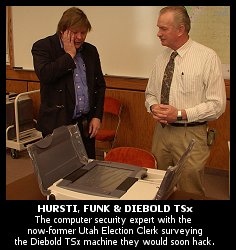 Funk was pushed out of his 23-year elected position in Utah after he allowed Hursti and Thompson to inspect the Diebold TSx touch-screen systems the state had forced Funk to employ for the 2006 elections. The tests in Utah revealed several major vulnerabilities characterized by computer voting experts as "the most severe security flaw ever discovered in a voting system" (New York Times), "the worst-case scenario" (Associated Press) and "a major national security risk" (BRAD BLOG). We interviewed Funk on the radio shortly after the incident while guest hosting on Peter B. Collins earlier this year. That interview can be heard here.
Funk was pushed out of his 23-year elected position in Utah after he allowed Hursti and Thompson to inspect the Diebold TSx touch-screen systems the state had forced Funk to employ for the 2006 elections. The tests in Utah revealed several major vulnerabilities characterized by computer voting experts as "the most severe security flaw ever discovered in a voting system" (New York Times), "the worst-case scenario" (Associated Press) and "a major national security risk" (BRAD BLOG). We interviewed Funk on the radio shortly after the incident while guest hosting on Peter B. Collins earlier this year. That interview can be heard here.


 Kamala Rising:
Kamala Rising: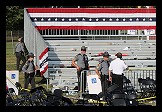 Evidence Fails to Establish Attempted Trump Assass-ination Politically Motivated
Evidence Fails to Establish Attempted Trump Assass-ination Politically Motivated Former MAGA 'Cultist' on the State of the Race for 'MAGA Americans': 'BradCast' 7/23/24
Former MAGA 'Cultist' on the State of the Race for 'MAGA Americans': 'BradCast' 7/23/24  'Green News Report' 7/23/24
'Green News Report' 7/23/24
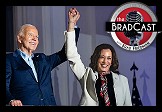 Biden Out, Endorses
Biden Out, Endorses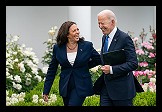 BIDEN DROPS REELECTION BID
BIDEN DROPS REELECTION BID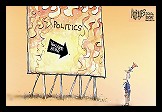 Sunday 'You Are Here' Toons
Sunday 'You Are Here' Toons What J.D. Vance Forgot to Tell You (and Lied About) at the RNC: 'BradCast' 7/18/24
What J.D. Vance Forgot to Tell You (and Lied About) at the RNC: 'BradCast' 7/18/24 'Green News Report' 7/18/24
'Green News Report' 7/18/24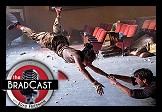 Holding on for Dear Life Amid the Political Whirlwind: 'BradCast' 7/17/24
Holding on for Dear Life Amid the Political Whirlwind: 'BradCast' 7/17/24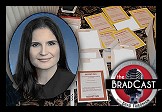 Cannon's Corruption: 'BradCast' 7/16/24
Cannon's Corruption: 'BradCast' 7/16/24 'Green News Report' 7/16/24
'Green News Report' 7/16/24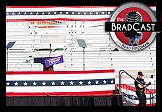 Amid the Assassination Attempt Aftermath:
Amid the Assassination Attempt Aftermath:
 Meanwhile... : 'BradCast' 7/11/24
Meanwhile... : 'BradCast' 7/11/24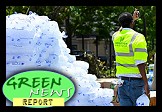 'Green News Report' 7/11/24
'Green News Report' 7/11/24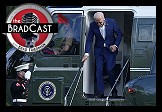 Paging 'Johnny Unbeatable'! Dems (Actually!) in Disarray!: 'BradCast' 7/10/24
Paging 'Johnny Unbeatable'! Dems (Actually!) in Disarray!: 'BradCast' 7/10/24 SCOTUS Immunity Ruling 'As Bad as it Sounds', And Worse: 'BradCast' 7/9/24
SCOTUS Immunity Ruling 'As Bad as it Sounds', And Worse: 'BradCast' 7/9/24 So, What Now?: 'BradCast' 7/8/24
So, What Now?: 'BradCast' 7/8/24 Debunking MAGA Cult Xenophobia
Debunking MAGA Cult Xenophobia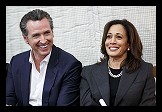 A Friendly Suggestion: Harris-Newsom 2024
A Friendly Suggestion: Harris-Newsom 2024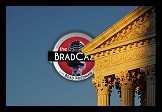 Prosecutor: SCOTUS Corruption Ruling Less Corrupt Than Appears: 'BradCast' 6/27/24
Prosecutor: SCOTUS Corruption Ruling Less Corrupt Than Appears: 'BradCast' 6/27/24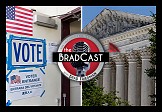 Good News and Bad: At the Polls and From the Corrupted Court: 'BradCast' 6/26/24
Good News and Bad: At the Polls and From the Corrupted Court: 'BradCast' 6/26/24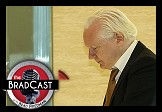 'Emptywheel' on Assange Hacking, Plea Deal: 'BradCast' 6/25/24
'Emptywheel' on Assange Hacking, Plea Deal: 'BradCast' 6/25/24
 VA GOP VOTER REG FRAUDSTER OFF HOOK
VA GOP VOTER REG FRAUDSTER OFF HOOK Criminal GOP Voter Registration Fraud Probe Expanding in VA
Criminal GOP Voter Registration Fraud Probe Expanding in VA DOJ PROBE SOUGHT AFTER VA ARREST
DOJ PROBE SOUGHT AFTER VA ARREST Arrest in VA: GOP Voter Reg Scandal Widens
Arrest in VA: GOP Voter Reg Scandal Widens ALL TOGETHER: ROVE, SPROUL, KOCHS, RNC
ALL TOGETHER: ROVE, SPROUL, KOCHS, RNC LATimes: RNC's 'Fired' Sproul Working for Repubs in 'as Many as 30 States'
LATimes: RNC's 'Fired' Sproul Working for Repubs in 'as Many as 30 States' 'Fired' Sproul Group 'Cloned', Still Working for Republicans in At Least 10 States
'Fired' Sproul Group 'Cloned', Still Working for Republicans in At Least 10 States FINALLY: FOX ON GOP REG FRAUD SCANDAL
FINALLY: FOX ON GOP REG FRAUD SCANDAL COLORADO FOLLOWS FLORIDA WITH GOP CRIMINAL INVESTIGATION
COLORADO FOLLOWS FLORIDA WITH GOP CRIMINAL INVESTIGATION CRIMINAL PROBE LAUNCHED INTO GOP VOTER REGISTRATION FRAUD SCANDAL IN FL
CRIMINAL PROBE LAUNCHED INTO GOP VOTER REGISTRATION FRAUD SCANDAL IN FL Brad Breaks PA Photo ID & GOP Registration Fraud Scandal News on Hartmann TV
Brad Breaks PA Photo ID & GOP Registration Fraud Scandal News on Hartmann TV  CAUGHT ON TAPE: COORDINATED NATIONWIDE GOP VOTER REG SCAM
CAUGHT ON TAPE: COORDINATED NATIONWIDE GOP VOTER REG SCAM CRIMINAL ELECTION FRAUD COMPLAINT FILED AGAINST GOP 'FRAUD' FIRM
CRIMINAL ELECTION FRAUD COMPLAINT FILED AGAINST GOP 'FRAUD' FIRM RICK SCOTT GETS ROLLED IN GOP REGISTRATION FRAUD SCANDAL
RICK SCOTT GETS ROLLED IN GOP REGISTRATION FRAUD SCANDAL VIDEO: Brad Breaks GOP Reg Fraud Scandal on Hartmann TV
VIDEO: Brad Breaks GOP Reg Fraud Scandal on Hartmann TV RNC FIRES NATIONAL VOTER REGISTRATION FIRM FOR FRAUD
RNC FIRES NATIONAL VOTER REGISTRATION FIRM FOR FRAUD EXCLUSIVE: Intvw w/ FL Official Who First Discovered GOP Reg Fraud
EXCLUSIVE: Intvw w/ FL Official Who First Discovered GOP Reg Fraud GOP REGISTRATION FRAUD FOUND IN FL
GOP REGISTRATION FRAUD FOUND IN FL


































